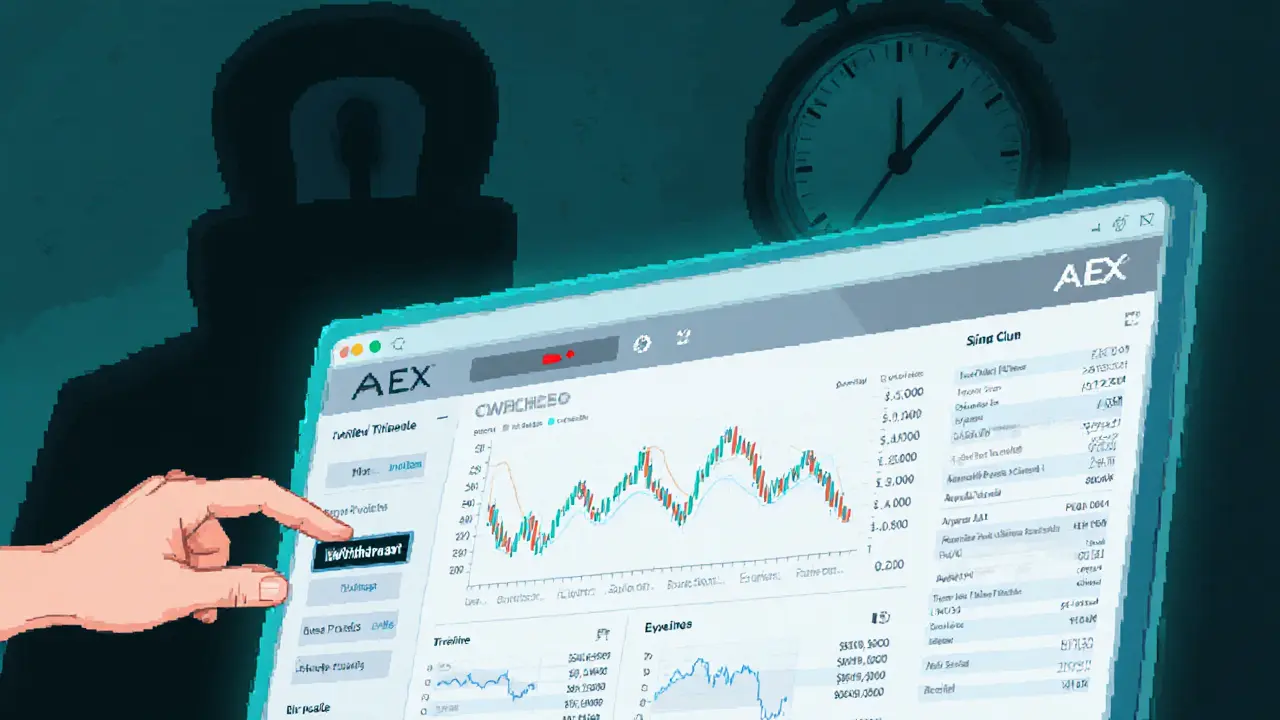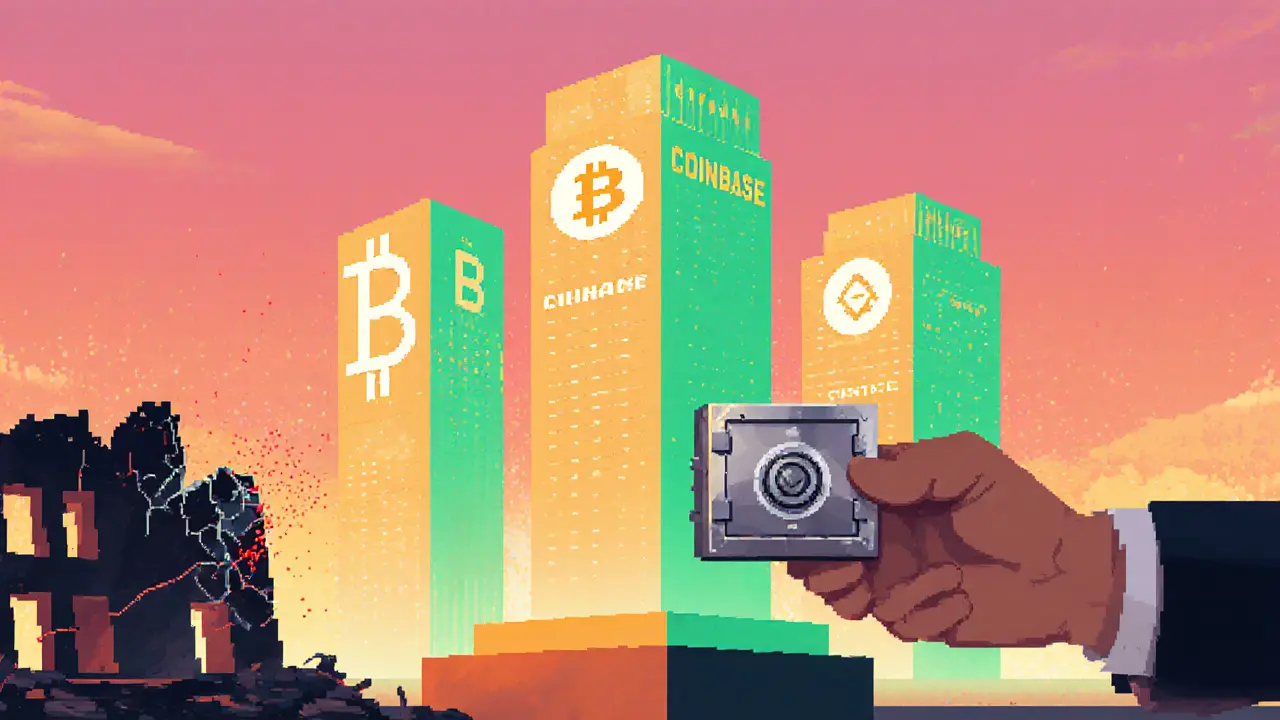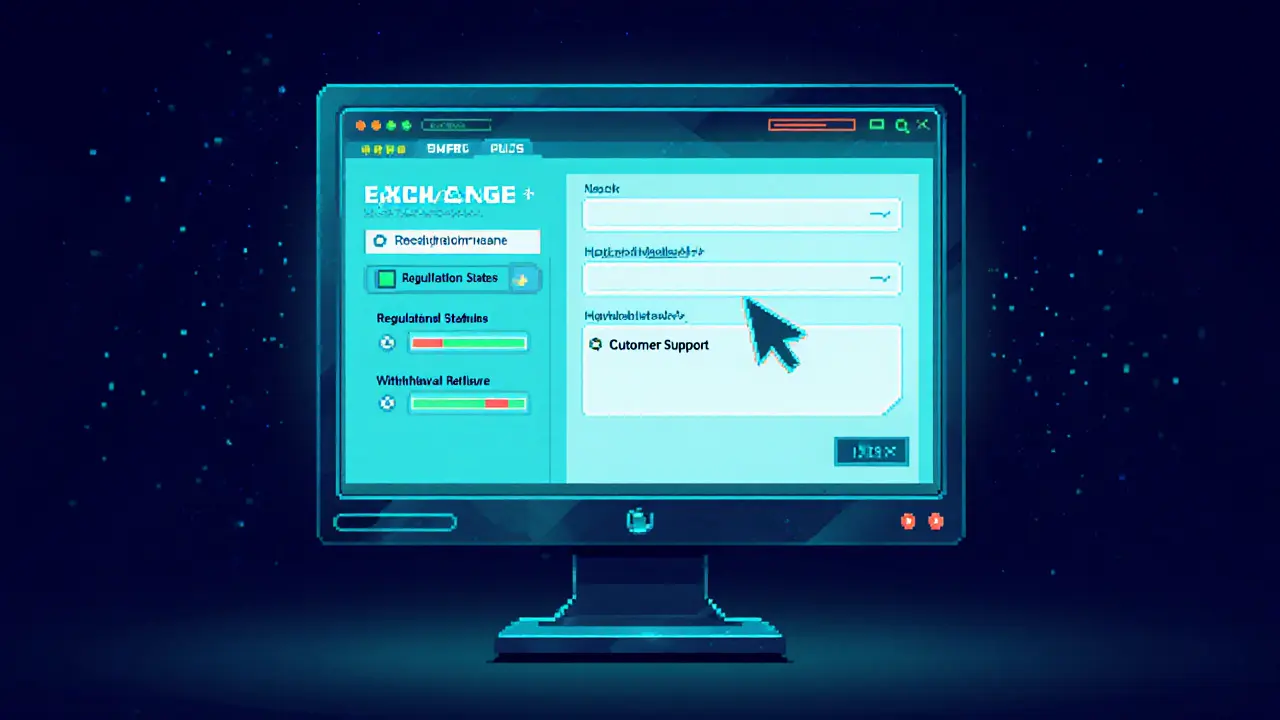AEX Exchange Risk Checker
How This Risk Checker Works
This tool evaluates exchanges based on three key factors:
- Regulation: Legitimate exchanges are licensed by financial authorities.
- Withdrawal Reliability: Can you access your funds quickly and reliably?
- Customer Support: Are there responsive channels to resolve issues?
Exchanges flagged as risky typically fail one or more of these criteria.
When you hear the name AEX crypto exchange review, you probably expect a rundown of features, fees, and maybe a recommendation. What you’ll actually find is a platform that looks polished on the surface but has been flagged as a fraud by multiple industry watchdogs. This article lays out the facts, walks through the red flags, and shows you how to spot similar scams before you ever deposit a single coin.
What Is AEX Exchange?
AEX Exchange is a cryptocurrency trading platform launched in 2017 by AEX Group Ltd. The service markets itself as a Chinese‑focused exchange offering a standard and a professional interface, plus extra modules like a DeFi Pool, mortgage‑style products, and staking services.
The platform supports a wide range of digital assets, but its most visible pair is USDT against major coins. It also promotes a fiat gateway that supposedly lets you fund your account via wire transfer or credit card, an attractive feature for newcomers who want to jump straight from a bank account into crypto.
How Does AEX Charge Fees?
On paper, AEX’s fee structure looks competitive. Both makers and takers pay a flat trading fee of 0.10% per transaction, which matches the average rate of many reputable exchanges in 2025. Bitcoin withdrawals cost 0.0005BTC, a figure that’s slightly lower than the historic 0.0008BTC norm.
Where the pricing gets murky is the credit‑card deposit fee. While many exchanges openly disclose a 2‑11% surcharge on card purchases, AEX never clarifies its exact rate, leaving users to guess how much of their capital might evaporate before they even start trading.
Regulation-or the Lack of It
The biggest warning sign for any crypto platform is regulatory oversight. AEX operates outside the United Kingdom and, according to BrokerChooser, it is "not regulated by a financial authority with strict standards". In the world of digital assets, regulation is the safety net that protects you when something goes wrong. Exchanges that are licensed by bodies like the FCA (UK), FINMA (Switzerland), or the SEC (U.S.) must adhere to anti‑money‑laundering rules, capital requirements, and regular audits.
Because AEX has no such license, it can’t be held to those standards. That gap makes it a prime target for fraud investigations and explains why multiple watchdogs have placed it on their blacklist.
Industry Verdict: AEX Is a Scam
Multiple independent sources have converged on the same verdict: AEX is a scam broker. Traders Union, a database that tracks fraudulent brokers, officially blacklisted AEX for 2024 and kept it there into 2025. Crypto Legal also lists AEX as a confirmed fraud case, citing numerous withdrawal delays and lost funds.
Real‑world users reinforce these findings. Since 2021, the platform has systematically delayed withdrawals, sometimes for weeks, without any explanation. Many traders report that customer support either gives generic canned replies or goes silent completely. When you can’t move your money out of an exchange, the technical features-charting tools, leverage options, mobile apps-become irrelevant.

Feature Overview (The Good, The Bad, The Dangerous)
- Trading Interfaces: Both a basic and a professional layout are available. The UI is clean and resembles other mainstream exchanges.
- DeFi Pool & Staking: Advertised as ways to earn passive income, but these services are tied to the same custodial wallet that’s already been flagged for withdrawal issues.
- Margin & Leverage: Offers up to 5x leverage on select pairs, increasing both potential profit and risk. Leverage on an unregulated platform amplifies the chance of losing everything.
- OTC Desk: Supposed to help high‑volume traders move large sums, yet the lack of regulation means there’s no recourse if the desk disappears with your funds.
- Mobile & Desktop Apps: Functional apps exist, but they cannot overcome the core problem of fund accessibility.
In short, the feature set looks impressive, but every advantage is shadowed by the platform’s inability to let users withdraw their own money safely.
Side‑by‑Side Comparison
| Aspect | AEX Exchange | Binance (Regulated) | Coinbase (Regulated) |
|---|---|---|---|
| Regulatory Status | Not regulated | Registered with multiple authorities (e.g., MAS, FCA) | US SEC‑registered, FCA‑licensed |
| Trading Fee (maker/taker) | 0.10% flat | 0.10% - 0.02% tiered | 0.50% - 0.00% tiered |
| Bitcoin Withdrawal Fee | 0.0005BTC | 0.0004BTC | 0.0005BTC |
| Deposit Methods | Wire, credit card (fees undisclosed) | Bank transfer, credit/debit card, crypto | Bank transfer, credit/debit card, PayPal |
| Withdrawal Reliability | Frequent delays, many reports of locked funds | Typically processed within 30 minutes | Within 24hours (US) or 48hours (EU) |
| Customer Support | Slow, generic replies, often unresponsive | 24/7 live chat, email, phone | Email, phone, live chat (business hours) |
| Additional Services | DeFi Pool, mortgage‑like products, staking | Launchpad, futures, savings accounts | Staking, earn, custodial services |
The table makes it clear: AEX can match fees but fails dramatically on regulation, withdrawal reliability, and support. Those are the pillars that keep your money safe.
How to Protect Yourself From Scam Exchanges
- Check Regulation: Look for a license number or a link to a regulator’s register. If you can’t find any, walk away.
- Read Independent Reviews: Trust sites like BrokerChooser or Traders Union that maintain blacklists of fraud platforms.
- Test Withdrawal Speed: Deposit a tiny amount (e.g., $20) and try to withdraw it within 24hours. If the exchange stalls, that’s a red flag.
- Avoid High‑Leverage on Unregulated Platforms: Leverage magnifies loss; combine that with no legal recourse, and you’ve got a recipe for disaster.
- Use Hardware Wallets: Keep the bulk of your holdings in a non‑custodial wallet where you control the private keys.
Following these steps can save you from the headaches-and the financial loss-experienced by countless AEX users.
Alternatives Worth Your Time
If you’re still looking for a place to trade, consider the following regulated exchanges that have a track record of transparency:
- Binance: Offers a wide range of coins, low fees, and is registered with regulators in multiple jurisdictions.
- Coinbase: Perfect for beginners, fully compliant with U.S. and EU regulations, and provides insurance on custodial funds.
- Kraken: Known for robust security measures and a strong compliance program.
All three provide reliable withdrawal pathways, clear fee schedules, and customer support that actually answers questions.
Bottom Line
Even though AEX boasts a modern interface and a menu of extra services, the platform’s unregulated status and documented withdrawal problems make it too risky for any serious trader. The consensus among regulators, fraud‑tracking databases, and real users is clear: stay away.

Frequently Asked Questions
Is AEX Exchange licensed in any jurisdiction?
No. AEX operates outside major financial regulators and is not listed on any official licensing registry, which is why watchdogs label it as unregulated.
Can I trust the 0.10% fee claim?
The fee is accurate, but it’s a classic “bait‑and‑switch” tactic. Many users never get to the point of paying the fee because withdrawals are blocked.
What should I do if I already deposited funds on AEX?
First, try a small withdrawal to test the process. If it fails, gather all transaction records and report the incident to your local consumer protection agency and to fraud‑tracking sites like Crypto Legal.
How does AEX’s DeFi Pool differ from standard staking?
The DeFi Pool is a custodial service that pools users’ tokens into yield‑generating contracts. Because the pool is controlled by AEX’s wallet, any withdrawal issue affects the entire pool, making it riskier than using a non‑custodial staking solution.
Are there any legitimate crypto exchanges that charge the same 0.10% fee?
Yes. Both Binance (on its basic tier) and Kraken offer a 0.10% flat fee for most spot trades, but they are fully regulated and have proven withdrawal reliability.








Jenae Lawler
January 15, 2025 AT 03:15It is noteworthy that the prevailing discourse surrounding AEX neglects the broader context of regulatory oversight. While many commentators laud superficial features, the absence of licensure remains a fundamental flaw that cannot be mitigated by UI polish. One must consider that unregulated entities operate without the fiduciary safeguards imposed by competent authorities. Consequently, any purported benefits are rendered moot when the platform's legal standing is indefensible. In light of these facts, prudence dictates complete abstention from participation.
Chad Fraser
January 15, 2025 AT 03:16Hey folks, just wanted to throw some positive vibes your way! Even though AEX looks shiny, there are plenty of solid alternatives that actually have your back. If you’re new, start with a regulated exchange and keep your crypto safe. Remember, the crypto community thrives when we lift each other up and share what works!
Jayne McCann
January 15, 2025 AT 03:18Honestly, I think people are missing the bigger picture here. AEX might look good on the screen, but if it isn’t checked by any authority, that’s a big red flag. Simple as that – no license, no trust. So I’d stay clear and pick a platform that’s known to be legit.
Richard Herman
January 15, 2025 AT 03:20I hear your enthusiasm, Chad, and I appreciate the upbeat tone. At the same time, it’s essential we remind newcomers that excitement should be paired with due diligence. Highlighting regulated exchanges alongside their safety records helps bridge optimism with responsibility. By fostering that balance, we ensure the community grows both confidently and securely.
Parker Dixon
January 15, 2025 AT 03:21🛡️ Let’s break this down step by step so everyone can follow the reasoning. First, the lack of regulation is not just a bureaucratic inconvenience; it removes a critical layer of protection that can prevent loss in case of malfeasance. Second, many users assume that a sleek interface equals reliability, but UI design rarely correlates with financial security. Third, when you deposit funds into a custodial wallet that isn’t overseen by any regulator, you effectively hand over control without any legal recourse. Fourth, the history of AEX includes multiple reports of delayed or outright blocked withdrawals, which is a red flag that cannot be ignored. Fifth, the platform’s stated fee structure may appear competitive, yet hidden costs-especially on credit‑card deposits-can erode any potential advantage. Sixth, the existence of DeFi pools and staking programs within the same custodial environment creates a single point of failure; if the exchange’s infrastructure collapses, all associated yields vanish. Seventh, leverage offerings on an unregulated exchange amplify risk, potentially wiping out capital in a single market swing. Eighth, the absence of a transparent audit trail makes it impossible for users to verify the health of the platform’s reserves. Ninth, reputable exchanges publish proof of reserves and undergo regular third‑party audits, a practice that AEX simply does not follow. Tenth, community support is another decisive factor; when you encounter an issue, you need timely, knowledgeable assistance, not canned responses. Eleventh, the documented experiences of users who have been left in limbo for weeks illustrate a systemic failure in customer service. Twelfth, regulatory bodies often step in to protect consumers, but without jurisdiction, there is no safety net. Thirteenth, many jurisdictions have issued warnings about AEX, reinforcing the collective caution. Fourteenth, the best practice is to test any new exchange with a minimal deposit and a quick withdrawal before committing larger sums. Finally, taking these precautions can save you from financial distress, protect your assets, and maintain confidence in the broader crypto ecosystem. 🌐💡
Stefano Benny
January 15, 2025 AT 03:23From a technical standpoint, AEX’s architecture suffers from a paucity of on‑chain transparency, which is a non‑negotiable prerequisite for any "technical" platform. The absence of a verifiable proof‑of‑reserves mechanism introduces systemic risk, especially when paired with custodial staking solutions that aggregate user assets. Moreover, the platform’s leverage engine operates without the safeguards mandated by regulated counterparties, raising the probability of liquidation cascades during market volatility. In short, the tokenomics and risk management protocols appear misaligned with industry best practices. ⚠️
Bobby Ferew
January 15, 2025 AT 03:25It seems you’ve managed to dress up the obvious shortcomings of AEX in a veneer of "technical" language, which, while impressive sounding, does little to mask the underlying fragility. The platform’s "on‑chain transparency" claim is, in practice, a smoke screen that hides the fact that users have no visibility into reserve allocation. One could argue that such obfuscation is intentional, given the pattern of withdrawal delays highlighted elsewhere. So, while the jargon flows smoothly, the reality remains: AEX is a high‑risk entity that demands caution.
celester Johnson
January 15, 2025 AT 03:26Consider the paradox of trust in a system that refuses to be audited: the very act of seeking security becomes an act of surrender. When a platform cloaks its inner workings, it invites speculation, and speculation breeds uncertainty-a fertile ground for peril. Thus, the philosophical lesson here is simple: transparency is the cornerstone of confidence, and without it, any edifice of finance is built on sand.
Prince Chaudhary
January 15, 2025 AT 03:28Friends, let us keep in mind that the most prudent approach to cryptocurrency investment is rooted in careful analysis and patience. While the allure of new platforms can be strong, a disciplined evaluation of regulatory status and withdrawal history will serve you better in the long run. I encourage you to take a measured step, perhaps by allocating a modest amount to test the waters, and then assess the experience before committing larger funds. Respect for your own capital is the first step toward sustainable growth.
John Kinh
January 15, 2025 AT 03:30Testing with a tiny deposit is the only sensible move.
Mark Camden
January 15, 2025 AT 03:31It is incumbent upon any responsible investor to recognize that the absence of a recognized licensing regime constitutes a categorical disqualification for participation. The regulatory frameworks established by competent authorities exist precisely to safeguard market integrity and consumer assets. Ignoring these pillars not only exposes one to undue risk but also undermines the collective effort to legitimize the cryptocurrency sector. Consequently, any recommendation to engage with an unregulated entity such as AEX reflects a fundamental misunderstanding of fiduciary duty.
Evie View
January 15, 2025 AT 03:33Wow, Mark, you really love preaching the lawbook, don’t you? It’s exhausting listening to the same lecture about "fiduciary duty" while real people are losing their savings on AEX. Your moral high ground feels more like a shield for your own complacency than genuine concern. Stop acting like a saint and acknowledge that many of us are already victims of the very "legitimacy" you champion.
Kate Roberge
January 15, 2025 AT 03:35Honestly, Mark, you sound like a broken record. Talking about regulations is fine until you realize most of the crypto world was built on bending the rules. People want freedom, not a parade of paperwork, and AEX tried to give that before it went south. So maybe cut the sermon and just admit that the market moves faster than your rulebook.